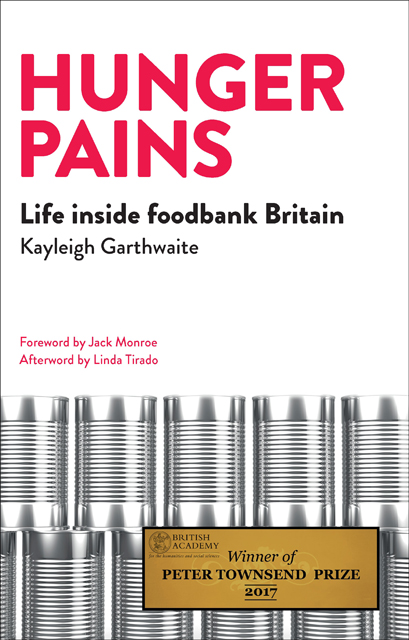Book contents
- Frontmatter
- Dedication
- Contents
- List of figures and boxes
- Acknowledgements
- Foreword by Jack Monroe
- Introduction
- one Researching foodbank use
- two Foodbanks: what do they do?
- three The politics of foodbank use in the UK
- four Why do people use a foodbank?
- five All work, low pay: finding, keeping and doing precarious jobs
- six “Doing the best I can with what I’ve got”: food and health on a low income
- seven Stigma, shame and “people like us”
- Conclusion: is foodbank Britain here to stay?
- Afterword by Linda Tirado
- Notes
- Bibliography
- Index
Introduction
Published online by Cambridge University Press: 15 April 2023
- Frontmatter
- Dedication
- Contents
- List of figures and boxes
- Acknowledgements
- Foreword by Jack Monroe
- Introduction
- one Researching foodbank use
- two Foodbanks: what do they do?
- three The politics of foodbank use in the UK
- four Why do people use a foodbank?
- five All work, low pay: finding, keeping and doing precarious jobs
- six “Doing the best I can with what I’ve got”: food and health on a low income
- seven Stigma, shame and “people like us”
- Conclusion: is foodbank Britain here to stay?
- Afterword by Linda Tirado
- Notes
- Bibliography
- Index
Summary
Field notes
Friday 6 March 2015
It had been a fairly quiet morning so far when a young woman came into the foodbank, nervously wrapping her battered winter coat around her pregnant bump. I took her red voucher and motioned for her to sit down with me, while Maureen made her a cup of tea. Gemma, 32, told me she lived around the corner from the foodbank in a private rented terraced house. It was her first visit to the foodbank. She and her partner have had no money for the last three weeks while they waited for their joint Jobseeker’s Allowance claim to be processed. Zero. I asked about her bump. It was very small, and I expected her to say she was around six months gone. Gemma said she was due to give birth to her first child on Tuesday, a son who they were naming Louie. Tuesday! “Have you told the DWP that you’re just days from giving birth?” I asked, shocked. “I was crying on the phone to ’em yesterday telling them that I’m pregnant. They still said it could be another week,” Gemma told me. “I don’t want my baby coming home to a house with no gas or electric. We have laminate floor and it’s so cold.”
So, four days before giving birth, Gemma was at the foodbank, asking for an emergency food parcel, when she should have been doing what other pregnant women would be doing four days before giving birth – maybe packing her hospital bag, or putting the finishing touches to the new nursery. Instead, she was making tearful, frustrated phone calls to the Department for Work and Pensions, sitting in a freezing cold house, worrying about how to feed herself, her partner and her new-born baby.
Welcome to foodbank Britain.
Britain is experiencing a foodbank explosion. Provision of informal food aid in the UK has existed for many years, without being widely publicised, documented or understood. But the growth of the network of Trussell Trust foodbanks, and the public attention which has surrounded this, means emergency food aid has become an ever more visible phenomenon. In 2004 the Trust ran only two foodbanks. In 2009–10, its foodbanks helped 41,000 people. Two years later, with the Coalition government in power, the Trussell Trust issued 128,697 vouchers in 2011–12.
- Type
- Chapter
- Information
- Hunger PainsLife inside Foodbank Britain, pp. 1 - 16Publisher: Bristol University PressPrint publication year: 2016



